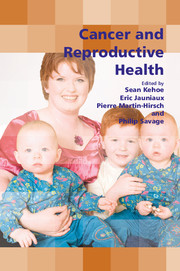Book contents
- Frontmatter
- Contents
- Participants
- Preface
- SECTION 1 Epidemiology, Genetics and Basic Principles of Chemotherapy and Radiotherapy
- SECTION 2 Fertility Issues and Paediatric Cancers
- SECTION 3 Gynaecological Cancers and Precancer
- SECTION 4 Diagnostic Dilemmas
- SECTION 5 The Placenta
- SECTION 6 Non-Gynaecological Cancers
- SECTION 7 Multidisciplinary Care and Service Provision
- SECTION 8 Consensus Views
- Index
Preface
Published online by Cambridge University Press: 05 October 2014
- Frontmatter
- Contents
- Participants
- Preface
- SECTION 1 Epidemiology, Genetics and Basic Principles of Chemotherapy and Radiotherapy
- SECTION 2 Fertility Issues and Paediatric Cancers
- SECTION 3 Gynaecological Cancers and Precancer
- SECTION 4 Diagnostic Dilemmas
- SECTION 5 The Placenta
- SECTION 6 Non-Gynaecological Cancers
- SECTION 7 Multidisciplinary Care and Service Provision
- SECTION 8 Consensus Views
- Index
Summary
The words cancer and reproduction conjure images of the human circle: death and the beginning of life itself. Both of these areas are very broad, encompassing the complexity of cancer and its varied biology, and the equally challenging areas of fertility, conception and pregnancy. While cancer afflicts primarily the elderly, it also occurs in younger age groups, with different implications specifically relating to reproduction. An even rarer situation is cancer occurring within pregnancy itself, although with more women delaying having a family this is becoming more common.
This book is derived from the 55th RCOG study group, which brought together acknowledged experts in cancer and human reproduction to address these issues. The sequelae of cancer and therapy in young women, the impact on fertility, and newer methods of fertility preservation through ovarian cryopreservation or adjusting standard surgical techniques are all included. The book also covers the incidence of cancer in pregnancy, how and when to intervene, how diagnostic tools are more limited or less accurate, and how therapies may affect the pregnant mother and fetus. Specific attention is focused on the more common cancers, the gynaecological cancers and placental tumours. As more recent evidence revealed the association between LLETZ and preterm labour, it seemed logical to include management of precancer cervical lesions pertaining to pregnancy.
- Type
- Chapter
- Information
- Cancer and Reproductive Health , pp. xi - xiiPublisher: Cambridge University PressPrint publication year: 2008



